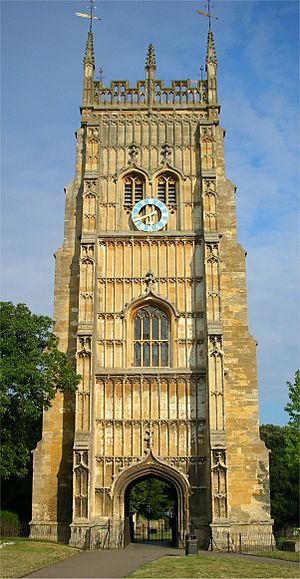Evesham Bell Tower facts for kids
The Evesham Bell Tower is a really old and tall tower in Evesham, England. It's special because it's the only part left of a huge old building called Evesham Abbey. A long time ago, between 700 and 710 AD, a saint named Saint Egwin started the Abbey. The tower itself was built much later, in the early 1500s, by a person called Abbot Lichfield.
Quick facts for kids Evesham Bell Tower |
|
|---|---|
 |
|
| Location | Evesham, Worcestershire, England |
| Architecture | |
| Architect(s) | Clement Lichfield |
| Style | Perpendicular Gothic |
| Completed | c. 1532 |
| Specifications | |
| Height | 110ft (33m) |
| Bells | 14 |
| Tenor bell weight | 35cwt-2qrs-20lbs (1813kg) |
Contents
Discovering the Evesham Bell Tower's Past
The Evesham Bell Tower has a fascinating history. It's especially interesting because it's the only part of the original Evesham Abbey that still stands today. It's a true survivor!
Why Was the Tower Built?
In 1513, a man named Clement Lichfield built a special chapel in a nearby church. The next year, in 1514, he became the leader, or Abbot, of Evesham Abbey.
In 1524, someone named John Molder left money to help build a "new Towre for their bells." This suggests a new tower was planned. Records show that the Abbey's main tower had fallen down twice before, in 1204 and 1264. This might be why they decided to build a separate bell tower, like the one at Chichester Cathedral.
Building the Tower
Building the tower started in 1531. Abbot Lichfield was in charge of the project. We don't know the exact date it was finished. However, it was definitely done by 1539.
Around this time, a big event called the Dissolution of the Monasteries happened. This was when King Henry VIII closed down many monasteries in England. Evesham Abbey was one of the richest monasteries. It was completely taken apart, but strangely, the new bell tower was left standing. The tower is 110 feet (33 meters) tall.
The Bells of Evesham
The Evesham Bell Tower is famous for its amazing bells. Over the years, the number and quality of the bells have changed a lot.
Early Bells and Changes
In 1664, four bells from nearby churches were melted down and reshaped. They were then added to two bells already in the tower. This created a set of six bells that could be rung together.
Later, in 1741, a bell maker named Abel Rudhall worked on the bells. He reshaped five of the six bells. He kept the largest bell, which was from 1631. He also made two new bells, bringing the total to eight. The heaviest bell at that time weighed about 29 hundredweight. In 1821, this heaviest bell was reshaped again and became even heavier, at 31 hundredweight.
Modern Bells and Their Sound
By 1910, the bells were very difficult to ring. So, they were rehung and two more bells were added, making a set of ten. However, people still thought these bells weren't as good as others made by John Taylor & Co of Loughborough.
Because of this, in 1951, all ten bells were melted down and reshaped at Taylor's foundry. They also added two more bells, creating a set of twelve. Later, in 1976 and 1992, two special "semitone" bells were added. These extra bells allow ringers to play different tunes without using the three heaviest bells. Today, the bells at Evesham are considered one of the best sets for "change ringing" in the whole country.
 | Roy Wilkins |
 | John Lewis |
 | Linda Carol Brown |

